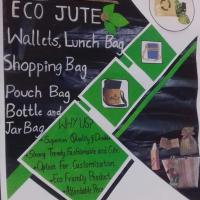
Sustainable Product Launch_Scouts For SDGs_Karnataka State_India
Sustainable Product Promotion
14/02/2020.
SDG 12 refers to "responsible consumption and production". Specifically, Target 12.1 has a single indicator to “Implement the 10‑Year Framework of Programmes on Sustainable Consumption and Production Patterns, all countries taking action, with developed countries taking the lead, taking into account the development and capabilities of developing countries"
The Eco-Friendly Products like Bio-Fertilizer, Earth Ball , Jute Bags , Cloth Bags, Paper Soap, Tycon sweets,Cattle Feed, Bio Hair syrum, Mint Mouth refreshner Spry and Tooth paste were introduced by us- The Future Entrepreneurs.
Sustainable products are those products that provide environmental, social and economic benefits while protecting public health and environment over their whole life cycle, from the extraction of raw materials until the final disposal.
Customer satisfaction: any products or services that do not meet customer needs will not survive in the market in a long term.
Dual focus: compared with purely environmental products, sustainable products focus both on ecological and social significance.
Life-cycle orientation: sustainable products are environmentally-friendly throughout their entire life. That is, from the moment the raw materials are extracted to the moment the final product is disposed of, there must be no permanent damage to the environment.
Significant improvements: sustainable products contribute to dealing with socio-ecological problems on a global level, or provide measurable improvements in socio-ecological product performance.
Continuous improvement: as the state of knowledge, technologies and societal expectation continually develop, sustainable products should also continuously improve with regard to social and environmental variation.
Competing offers: sustainable products may still lag behind competing offers, therefore, the competing offers may serve as a benchmark regarding social and ecological performance.
Organic food are foods that are produced using methods involving no agricultural synthetic inputs, for instance, synthetic pesticides, chemical fertilizers, genetically modified organisms (GMO), and are not processed using irradiation, industrial solvents, or chemical food additives.








